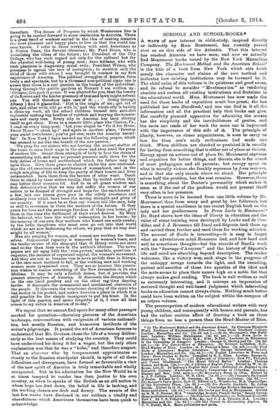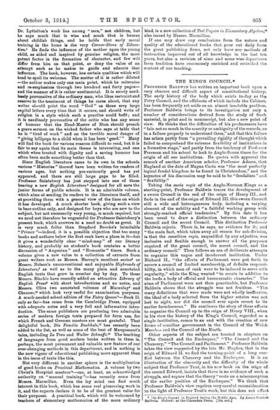SCHOOLS AND SCHOOL-BOOKS!
WAVE of new interest in child-study, inspired directly or indirectly by Mule. Monteseori, has recently pasted
over us on this side of the Atlantic). That this interest has reached America we have seen, and now we actually find Montessori books issued by the New York Macmillan
Company. The Montessori Method and the American SchooZ1 is the title of a book from New York which sets forth sanely the character and claims of the new method and indicates bow existing institutions may be leavened by it. The chief value of this volume is its quietness and good sense, and its refusal to consider " Montessorisua" ae rendering obselete and useless all existing institutions and doctrines in the educational world. Mme. Montessori has now made the need for these books of exposition much less great; she lute published her own Handbook,' and one can find in it all the information and all the practical help that books can give. Her carefully planned apparatus for educating the senses has the simplicity and the inevitableness of genius, and the more one reads of her work the more one is impressed with the importance of this side of it. The principle of liberty, however, on closer acquaintance, is seen to carry us less far than one's early enthusiasm had made one think. When children are checked or punished it is usually for having done something that is either out of place or vicious. Energy spent on actions out of place Dr. Montessori captures and organizes for better things, and therein she is far ahead of most pedagogues and all parents; but energy spent on what is morally vicious she frankly represses by force majoire, and in that she only stands where we stand. Her principle solves half the problem, but the rest remains. However, there is something about the Doctor's personality which makes it seem as if the rest of the problem would not present itself very often in her presence.
There is more to be learned from one little volume by Dr. Montessori than from many and great by her followers, but there is a special excellence in one recent English book on the lady and her predecessors. In From Locke to Montessor;4 Dr. Boyd shows how the ideas of liberty in education and the value of sense training were developed by Locke and de Con- dillac and J. J. Rousseau till Itard and Segouin took them up and carried them further and used them for working miracles. The account of Emile is interesting—it is easy to forget what an adventurous mind Rousseau had, and how hard and well he sometimes thought—but the records of Itard's work with the " Sauvage d'Aveyron " and the history of &grain's life and mind are absorbing beyond description. The reader welcomes, like a victory won, each stage in the progress of the unhappy savage towards the light, and the unending, patient self-sacrifice of these two apostles of the idiot and the mute seems to place their names high on a noble list that always makes good reading. The book is well written as well as extremely interesting, and it conveys an impression of matured thought and well-based judgment which interesting books on education cannot always claim. Nothing much better could have been written on the subject within the compass of an octavo volume.
The preoccupation of modern educational writers with very young children, and consequently with homes and parents, has had the rather curious effect of drawing a book on these things from no less a person than the Head-Master of Eton.
• (1) The Montessori Method and the American School. By Florence Elizabeth Ward, Professor of Kindergarten Education, Iowa State Teachers' College. London : Macmillan and Co. [5s. 6d. net.]—(2) Dr. Montessori's Own Hand- book. London, William Heinemann. [3e. 6d. net.]—(3) From Locke to Montessori. By William Boyd, M.A., B.Sc., D.Phil., Lecturer in Education in the University of Glasgow. London : George G. Harrap and Co. [25. 6d. net.] —(4) The Corner-Stone of Education. By Edward Lyttelton, D.D., Head-blaster of Eton. London : G. P. Putnam's Sons. [5a. net.:--(3) First Books of Literature: English Literature. By George Saintsbary, D.Litt. London : Macmillan and Co. [la. 6d.]—(6) English Literature in Prose and Vans : From Dryden to Burke. Compiled by E. L. Elias. London: George G. Harmp and Co. [is. 5d.]—(7) Highroads of Literature : Book VI., Thoughts and Voices. Illustrated. " The Royal School Series." London Thomas Nelson and Sons. [28.]—(8)_ A Library of English Prose. Edited by W. H. D. House, Litt.D. De tausncey's English Mail Coach: Holinshed on England in the Sixteenth Century: Waslanyton Irving's Companions of Columbus. Loudon Mackie and Son. [10d. each.)—(9) Macaulay's Essay on Clive. Edited by A. J. P. Collins. London : W. B. Clive. [Is. 6d.]—(10) Chaucer's Parlement of Ponies. Edited bk.C. M. Drennan, M.A. Same publisher. [2s. 6d.1— (11) Spenser's Fairy en, Book II. Edited by L. Winstanies, M.A. Cambridge : at the University Press. [2s. 6d.]—(12) The Familia Buchholz. By Julius Stinde. Edited by G. H. Clarke, M.A. " Cambridge Modern German Series." Same publishers. [2s. 6d.)—(18) Six Conte, par Guy de Maupassant. Edited by H. N. P. Sloman, M.A. " Cambridge Modern French Series," Senior Group. Same publishers and price.—(14) Practical Mathematics for Technical Students: Part I. By T. 8. Usherwood B.So., Are., and C. J. A. Trimble, B.A. Loudon Macmillan and Co. [3a. ed.]—(15) Test Papers in Elementary Algebra. BY C. V. Durell, M.A. Some publishers and price, Dr. Lyttelton's work lies among " men," not children, but be says much that is wise and much that is human about childish things, and he holds that early moral training in the home is the very Corner-Stone of Educa- tion.* He finds the influence of the mother upon the young child, as aided and inspired by genuine religion, the most potent factor in the formation of character, and few will differ from him on that point, or deny the value of an attempt such as he makes to guide and educate that influence. The book, however, has certain qualities which will tend to spoil its welcome. The matter of it is rather diluted —the author makes only one main point, which he reiterates and re-emphasizes through two hundred and forty pages— and the manner of it is rather sentimental. It is surely need- lessly provocative of the ordinary man, who likes restraint and reserve in the treatment of things be cares about, that any writer should print the word " God " as three very large capital letters every time that it occurs, and should write of religion in a style which such a practice could befit ; and it is needlessly provocative of the critic who has any sense of humour that the Head-Master of Eton should preach a grave sermon on the wicked father who says at table that he is "tired of work" and on the terrible moral danger of "giving lollipops to a child when it has been ' good!" Many will find the book for various reasons difficult to read, but it is fair to say again that its main theme is interesting, and one which when treated with dignity and a saving humour has often been made something better than that.
Since English literature came to its own in the schools various " Histories " thereof have been written for readers of various ages, but nothing pre-eminently good has yet appeared, and there are still large gaps to be filled. Professor Saintsbury has just stepped into one of these bearing a new English Literature5 designed for all save the junior forms of public schools. It is an admirable volume, which aims at sending its readers to the literature itself, and at providing them with a general view of the lines on which it has developed. A much shorter book, giving such a view in bare outline only, and designed for boys who are new to the subject, but not necessarily very young, is much required, but we need not therefore be ungrateful for Professor Saintsbury's present book, which answers to a need no doubt as great. It is very much fuller than Stopford Brooke's inimitable "Primer "—indeed, it is a possible objection that too many books and authors below the first rank have a place in it—but it gives a wonderfully clear " mind-map" of our literary history, and probably no student's book contains a better discussion of " Augustan" and "Romantic " times. Such a volume gives a new value to a collection of extracts from great writers each as Messrs. Harrap's excellent series" or Messrs. Nelson's unconventional and enjoyable Highroads of Literature,7 as well as to the many plain and annotated English texts that grow in number day by day. To these Messrs. Blackie have recently added an attractive Library of English Proses with short introductions and no notes, and Messrs. Clive two annotated volumes of Macaulay' and Chaucer," which look very useful for examination purposes. A much-needed school edition of the Fae.ry Queen"—Book II. only so far—has come from the Cambridge Press, equipped with adequate notes and a very full and informative intro- duction. The same publishers are producing two admirable series of modern foreign texts prepared for form use, for which French and German masters are most grateful. That delightful book, Die Familie Buchholz,u has recently been added to the list, as well as some of the best of Maupassant's tales, including Le Trou and Walter Schnals.la The teaching of languages from good modern books written in them is, perhaps, the most permanent and valuable new feature of our ever-changing methods in this department, and in nothing is the new vigour of educational publishing more apparent than in the issue of texts like this.
Not very different in another sphere is the multiplication of good books on Practical Mathematics. A volume by two Christ's Hospital masters"—one, at least, an acknowledged authority on " manual training "—has recently come from Messrs. Macmillan. Even the lay mind can find much interest in this book, which has some real pioneering work in it, and the experts declare it to be of the greatest value for their purposes. A practical book, which will be welcomed by teachers of elementary mathematics of the more ordinary
kind, is a new collection of Test Papers in Eicnzentary Algebra," also issued by Messrs. Macmillan.
If one may draw any conclusions from the nature and quality of the educational books that pour out daily from the great publishing firms, not only have our methods of instruction improved out of all knowledge in the last ten years, but also a revision of aims and some wise departures from tradition have enormously enriched and revivified the content of our teaching.











































 Previous page
Previous page